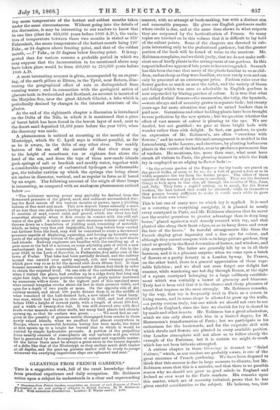GLEANINGS FROM FRENCH GARDENS.* Tins is a suggestive work, full
of the exact knowledge derived from practical experience and daily occupation. Mr. Robinson writes upon a subject he understands in a clear and unpretending
• Gleanings from French Gardens, comprising an Account of such Features of French Horticulture as are ntost worthy of Adoption in British Gardens. By W. Robinson, F.L.S. With numerous Illustrations. London; F. Warne and Co. 1868.
manner, with no attempt at book-making, but with a distinct aim and reasonable purpose. He gives our English gardeners credit where credit is due, and at the same time shows in what respects they are surpassed by the horticulturists of France. So many topics are touched on in this volume that it is difficult to lay hold of the salient points. Some of the chapters are devoted to sub- jects interesting only to the professional gardener, but the greater portion of the book will be found of value to the amateur. Mr. Robinson complains, and we think justly, that we do not make suffi- cient use of hardy plants in the arrangement of our gardens. In this respect indeed we appearof late years to have retrograded. So much has this been the case that many of the plants familiar to us as chil- dren, and as cheap as they were familiar, are now rarely seen and can only be procured at an extravagant price. Fashion rules over the flower garden as much as over the toilet, and the variety of bloom and foliage which was once so admirable in English gardens is now superseded by blazing patches of colour. It is true that what are called florists' flowers—the ranunculus, the tulip, the hyacinth, —were always and of necessity grown in separate beds ; but twenty years ago far more attention was paid to mixed borders than is paid now. Geraniums and other bedding plants have been brought to rare perfection by the new system ; but we question whether the effect of vast masses of colour is pleasing to the eye. We are dazzled, but not gratified ; we gaze at these bright beds with wonder rather than with delight. In fact, our gardens, to quote an expression of Mr. Robinson's, are often "overdone with flowers ;" and he notes how this mal-arrangement is avoided in the Luxembourg, in the Louvre, and elsewhere, by planting herbaceous plants in the centre of the border, so as to produce a permanent line of verdure. He mentions, too, more than once, what must have struck all visitors to Paris, the pleasing manner in which the Irish ivy is employed as an edging to flower beds :—
" In the private garden of the Emperor the ivy bands aro placed on the gravel walks, or seem to be so ; for a bolt of gravel a foot or so in width separates the ivy from the border proper. The effect of these outside of the masses of gay flowers is excellent. They are the freshest things to look upon in that city, all through the mouths of May, June, and July. They form a capital setting, so to speak, for the flower borders, the best indeed that could be obtained; while in themselves they possess beauty sufficient to make it worth one's while to grow them for their own sakes."
This is but one of many uses to which ivy is applied. It is used as a covering to everything unsightly, it is planted in nearly every courtyard in Paris, and Mr. Robinson observes that he never saw the scarlet geranium to greater advantage than in deep long boxes," placed againstta wall densely covered with ivy, and that planted also along their front edges, so as to hang down and cover the face of the boxes." In tasteful arrangements like these the French display great ingenuity and a fine eye for colour, and although they cannot compete with us in largo private gardens, they excel us greatly in the floral decoration of houses, and windows, and city courtyards. The latter are generally left by us in all their bareness, and it is a pleasant surprise when we come upon a batch of flowers or a pretty fernery in a London byway. In France, on the other hand, there is a general appreciation of these vege- table felicities ; and we shall not soon forget our delight last summer, while wandering one hot day through Rouen, at the sight of a square courtyard belonging to a large millinery establish- ment which was veritably a bower of greenery and blossoms. Truly has it been said that it is the chance and cheap pleasures of travel that impress us the most strongly. Mr. Robinson remarks, by the way, that ivy is frequently used in Paris as a screen in living rooms, and in some shops is allowed to grow up the walls, —a pretty custom truly, but one which we should not care to see adopted in England, since the love we cherish for ivy is shared in by snails and other insects. Mr. Robinson has a great admiration, which we can only share with him in a limited degree, for M.
Haussmann's transformation of Paris; but we participate in his enthusiasm for the boulevards, and for the exquisite skill with which shrubs and flowers are planted in every available position.
Our London atmosphere will not allow us to follow closely the example of the Parisians, but it is certain we might do much which has not been hitherto attempted.
A curious chapter in these Gleanings is devoted to "Salad Culture," which, as our readers are probably aware, is one of the great successes of French gardening. We have been disposed to think that this success is due in large measure to climate, but Mr. Robinson avers that this is a mistake, and that there is no possible reason why we should not grow as good salads in England and Ireland as ever went to the Paris markets. His remarks upon this matter, which are of necessity technical, prove that he has
given careful consideration to the subject. He believes, too, that with proper attention we could grow in these islands peaches as good and as cheap as ever were produced at Montreuil, and that instead of that delicious fruit being a mere article of luxury, it might be profitably grown for general consumption.
In conclusion, we thank Mr. Robinson for an instructive book on a subject which possesses some interest for all readers. Gardening is an expensive amusement when carried out with all the appliances of art ; but gardening, which is one of the most exquisite and satisfactory of pleasures, possesses the great ad- vantage that it may be brought to much perfection on a small scale, and with very limited means. From the amateur it asks more for taste than money, more for love than science, and we venture to assert that it yields quite as much delight to the man who gardens on a small scale, but with his own hinds, as to the millionaire, with his lines of glass houses and his acres of pleasure- grounds.































 Previous page
Previous page